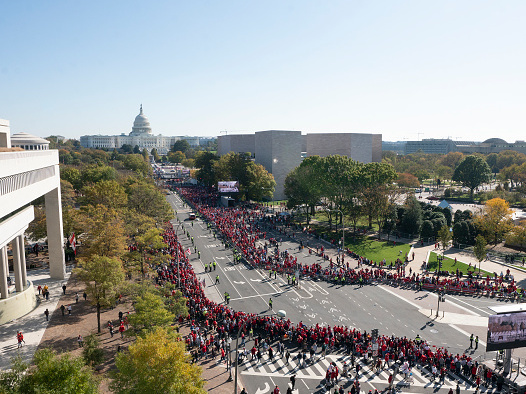When Nationals Play in Home Again

Fans assemble in Washington, D.C. on Nov. 2, 2019 as the Washington Nationals concur a parade to celebrate their World Serial victory over the Houston Astros. Stefani Reynolds/Getty Images hide caption
toggle caption
Stefani Reynolds/Getty Images

Fans get together in Washington, D.C. on Nov. 2, 2019 as the Washington Nationals hold a parade to celebrate their Globe Series victory over the Houston Astros.
Stefani Reynolds/Getty Images
Thousands of baseball fans sporting ruddy caps and sweatshirts, emblazoned with the Washington Nationals' curly Due west, lined Constitution Avenue in Washington on Saturday to gloat the team'due south celebrated Earth Series victory.
On Midweek, the Nationals defeated the Houston Astros in Game 7 of the series with a vi-ii improvement, clinching the city's offset baseball championship in 95 years.
Next on the team's schedule — a visit with President Trump.
The Nationals are scheduled to run across Trump on Monday, standing a time-honored tradition of championship teams traveling to the White House for a coming together with the president. Just in a city where partisan politics has long been the ascendant sport, Monday's visit has itself taken a political plough.
On Fri, Nationals pitcher Sean Doolittle publicly confirmed that he volition skip the event. Doolittle has been vocal nigh his opposition to many of the administration'south policies.
"There's a lot of things, policies that I disagree with, just at the end of the twenty-four hour period, it has more to do with the divisive rhetoric and the enabling of conspiracy theories and widening the divide in this country," Doolittle told The Washington Post. "At the end of the day, as much as I wanted to exist there with my teammates and share that experience with my teammates, I can't do it."
Fifty-fifty before Doolittle's conclusion, this year'due south World Serial had delved into politics. During Game five of the series, Nationals fans booed Trump during an appearance at the squad's Nationals Park and taunted him with cheers of "lock him up." During Game 7 in Houston, more than sixteen,000 Nationals fans gathered for a free viewing party back in Washington and once more broke into boos when a Trump campaign advertizement aired during a commercial break.
While the fan response captured headlines, information technology was inappreciably the first instance of baseball intersecting with Washington politics.
The kickoff team visit to the White House was in 1865. That summer, Washington, D.C. held a 3-team baseball game tournament. The Athletic from Philadelphia shell the Washington Nationals to win the tournament, but both teams were invited to visit the White Firm to meet President Andrew Johnson. As the story goes, the players from both teams attended and then one by one, shook the president'southward hand.
Even and then, the meeting had a political motivation. According to The Atlantic'due south Yoni Appelbaum, this first meeting was arranged past the president of the National club, Arthur Pue Gorman, a white Southerner and Johnson supporter who in the aftermath of the Civil State of war wanted to maintain racial segregation. He saw baseball — which was then an all-white sport — and the meeting with Johnson as a way to practise this.
It wasn't until the presidency of Ronald Reagan more a century subsequently that invitations for championship teams from beyond the sports earth became a regular occurrence. So too did the practice of players snubbing those invitations.
In 1991, for instance, afterward the Chicago Bulls won their first NBA title, Michael Jordan decided to play golf game rather than meet with President George H.Westward. Bush.
Golfer Tom Lehman declined a coming together with President Bill Clinton, referring to him as a "typhoon-dodging babe killer."
Jake Arrieta of the Chicago Cubs skipped a visit to the Obama White House, as did Boston Bruins goalie and Tea Party supporter Tim Thomas.
Merely under the Trump administration in that location has been an uptick in the number of players — and in some cases entire teams — rejecting invitations to visit the White House, citing everything from scheduling conflicts to outright objections to the president's policies.
The uptick, in function, may be due to a shift in public attitudes. Athletes who were once expected to keep their opinions silent are at present cheered by some fans for speaking up and other times jeered when they choose non to.
When teams take accepted invitations, the decision by some players not to attend has frequently overshadowed the actual visit. Afterward their victory in terminal twelvemonth'south World Serial, the Boston Cerise Sox visited the White House, but when they did, almost every nonwhite thespian and autobus on the squad was noticeably absent.
In 2017, the White House rescinded an invitation altogether later members of the NBA champion Aureate State Warriors said that they were considering skipping the upshot. Trump tweeted the decision, saying, "invitation is withdrawn!" It was considered the first fourth dimension a president always pulled back an invite because of a spat with players.
This by summer during the Women's World Cup, members of the Women's National Soccer squad, including Megan Rapinoe, said that if they won the tournament, they would refuse an invitation to the White House. Trump responded, saying Rapinoe "should never boldness our Country." The team ultimately won the World Cup, but did not receive an invitation to the White Business firm.
Since Doolittle announced his decision, he told The Washington Post that he has received a flurry of social media messages from those who disagree with his decision, calling it disrespectful.
Source: https://www.npr.org/2019/11/02/775692075/when-nationals-visit-the-white-house-sports-and-politics-will-intersect-once-aga
0 Response to "When Nationals Play in Home Again"
Post a Comment